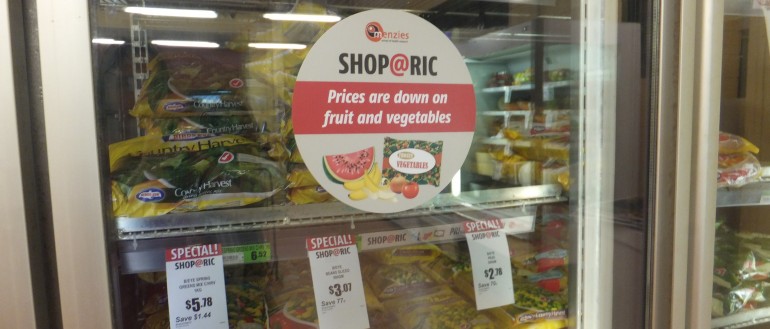Aims:
- To test the impact and cost effectiveness of a store-based price reduction intervention to promote the purchase of fruit, vegetables, low joule soft drinks and water and to reduce the purchasing of sweetened soft drinks among residents in remote Aboriginal communities in the Northern Territory.
Summary:
There is growing evidence on the potential of price subsidies to support healthy food choices. This study also assessed the added value of an in-store nutrition education strategy.
A 20% price discount was applied to fresh and frozen fruit and vegetables, water and low joule soft drinks in 20 remote Indigenous community stores throughout the Northern Territory for a period of 24 weeks.
The Nutrition education strategy was implemented in 10 of these communities. A stepped wedge design was used.
Implications for policy and practice:
The inferior health of Indigenous Australians relative to other Australians and the role of poor nutrition in the health disparity present a compelling reason to identify cost-effective interventions for nutrition improvement. Informing policy and practice is not just about ’what works’ but better understanding ’how it works’.
Together with remote community store boards, ALPA and Outback Stores, this study will provide original evidence on the effectiveness and cost-effectiveness of price discounts with or without an in-store nutrition education intervention on food and drink purchasing among a socio-economically disadvantaged population in a real-life setting.
Our research has found:
A price discount on fruit and vegetables can positively modify fruit and vegetable and water purchases. The consumer education strategy was associated with a small additional benefit on vegetables sales.
Neither the price discount nor the consumer education strategy showed an effect on artificially sweetened soft drinks or regular soft drinks. Shifting sugar-sweetened beverages in a desired direction may require targeted approaches to reduce their sales such as increasing the price, minimising the range, concealment of full sugar drinks, and placing in low traffic areas in the store, rather than only encouraging replacement with bottled water or artificially sweetened soft drinks.
Price discounts with consumer education strategies that promote healthy foods and discourage less healthy foods can be used as part of multi-component strategies to help make the healthy choice the easy choice for consumers in remote communities.
Chief investigator:
Project manager:
Contact information:
Project dates:
This trial commenced in June 2013 and concluded in December 2014.

